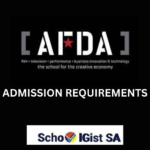
To gain admission into the ADFA Cape Town, a candidate must meet the school admission requirements. It is very important for all aspirants to check the AFDA requirements and be sure they meet the requirement before applying to AFDA. This post will provide you with all the necessary information on AFDA admission requirements as stated on the institution’s website.
AFDA admission requirements are as follows:
AFDA ADMISSION REQUIREMENTS
Higher Certificate
ENTRY INTO FIRST YEAR
- National Senior Certificate (South African Grade 12 / Matric) with entry into a Diploma or Higher Certificate.
- Should you not have the above, you may be able to qualify to complete and pass the AFDA Entrance Exam.
Undergraduate Bachelors Degree (BA / BCOM)
ENTRY INTO FIRST YEAR
- National Senior Certificate (South African Grade 12 / Matric) with entry into a Bachelor’s degree.
- You may enter an AFDA degree if you have successfully completed the AFDA Higher Certificate course.
- The National Skills Certificate / National Certificate (Vocational) (NCV) on NQF level 4 with 3 fundamental subjects (incl English) above 60% and 4 vocational subjects above 70%.
- A technical N5 certificate with 4 subjects passed on N5 level including Maths and English.
- The ACE School of Tomorrow (Accelerated Christian Education) on an achievement level similar to matric exemption.
- If you don’t have matric exemption but have passed the first year of an accredited programme on NQF 6 or 7 (first year of a diploma or degree).
- Should you not have any of the above, you may be able to qualify to complete and pass the AFDA Entrance Exam.
- If you do not have matric exemption but are 23 years or older, you can apply for an exemption to study a degree at AFDA with HESA.
- Alternatively, you can take the Entrance Exam.
- Please contact your nearest AFDA campus to find out more.
ENTRY INTO SECOND YEAR
- Check the Recognised Prior Learning below
Postgraduate Honours Degree (BA HONS) or Postgraduate Master of Fine Arts (MFA)
ENTRY INTO HONOURS OR MFA
- Check the Recognised Prior Learning below
RPL INTO 1ST, 2ND, HONOURS YEAR OR MFA
RPL stands for Recognition of Prior Learning. It arises from an international tendency in this century to increase students’ access to education, by articulating various types and levels of education with each other, so that there can be lifelong learning and no one is barred from higher education. In South Africa, it was a core principle of the White Paper on Higher Education in the late nineties, and again in the January 2012 Green Paper for post-school education and training issued by The Department of Higher Education and Training.
All higher education institutions in South Africa must have a policy and procedure to assess prospective students’ RPL to see if they can enter the courses with a reasonable chance of success.
Students with matric exemption to study a bachelor’s degree may enter into the first year of degree studies. AFDA’s alternative routes to access degree studies are:
- You can enter the Higher Certificate on NQF5; which will then articulate to give you the right to enter the BA degree the next year, on successful completion of the Higher Certificate.
- The AFDA Entrance Exam, adopted by the AFDA Senate, for those candidates who have passed matric; and
- RPL from other relevant and equal qualifications.
Please view some ways to access AFDA degree studies through RPL below. We do however offer alternative RPL access routes to the AFDA degrees. To inquire if you qualify, please send us an email with your enquiry or request an interview using the link on this page.
RPL IN SECOND YEAR OF A BACHELOR’S DEGREE
- The minimum requirements to bridge into 2nd year are that you’ve completed 1st year at a registered university in a relevant field and have no outstanding credits.
OR
- You have 5 years of relevant experience in the industry with key responsibilities and roles;
AND
- That you pass a formal assessment of the discipline you want to enter.
- To find Discipline-specific RPL processes, please refer to the Academic Yearbook.
RPL INTO HONOURS
The minimum requirements to bridge into Honours are that you’ve completed a BA at AFDA or a registered university in a relevant field and have no outstanding credits.
OR
You have 5 years of relevant experience in the industry with key responsibilities and roles;
AND
That you pass a formal assessment of the discipline you want to enter.
To find out more about the RPL processes, please refer to the Academic Yearbook.
You can enter the AFDA Honours degrees if you have an equivalent Bachelors degree, and pass the RPL assessment e.g. A BCom and production experience can give you access to study BA (Honours) in Motion Picture Medium with Producing as a major elective discipline, or an architecture qualification and design experience can be assessed to give you access to the Production Design discipline; or if you have a degree in which you learned about language, texts and writing and/or if you applied it in your work experience (e.g. as a journalist) you may be successfully assessed to enter into the Scriptwriting elective discipline in Honours; or if you have a degree with fashion modules you may be successfully assessed to enter into the costume Make-up and Styling elective discipline in Honours.
RPL INTO MASTER OF FINE ARTS (MFA)
- The minimum requirements to bridge into Master of Arts in Fine Arts is that you’ve completed a Honours at a registered university in a relevant field and have no outstanding credits.
OR
- You have 10 years of relevant experience in the industry with key responsibilities and roles;
AND
- That you pass a formal assessment of the discipline you want to enter.
- To find Discipline-specific RPL processes, please refer to the Academic Yearbook.


Leave a Reply